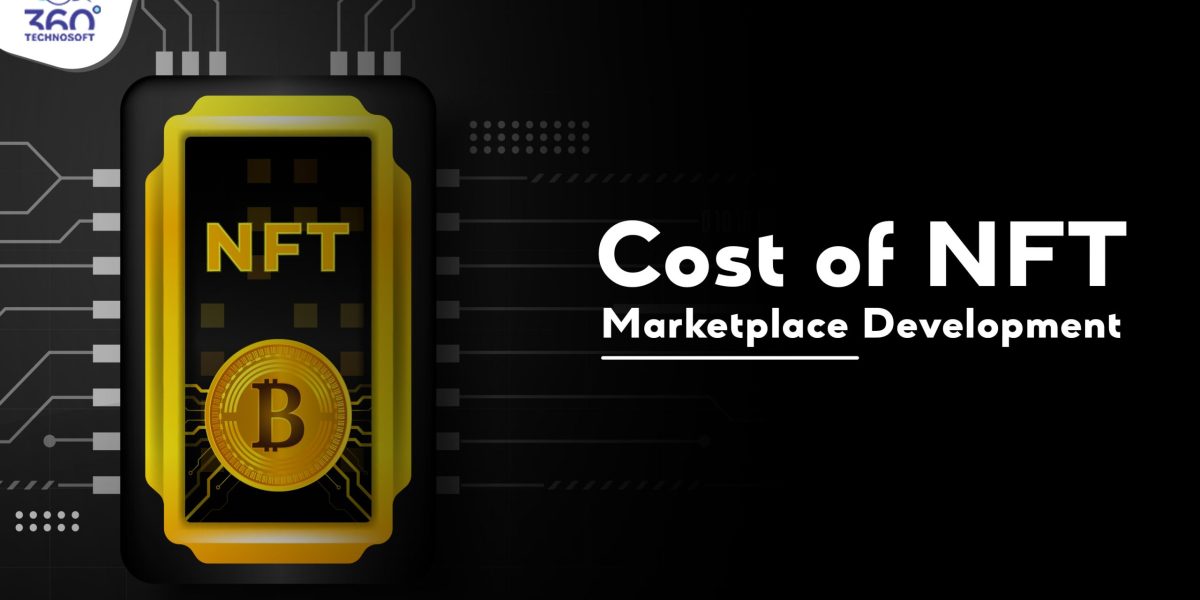NFT marketplaces such as OpenSea, Rarible, and Superfarm have emerged as significant hubs for funding and substantial revenue generation. According to Statista’s analysis, the projected annual growth rate of the NFT market revenue is estimated to be 27.26% from 2022 to 2027, culminating in an anticipated total of approximately $8,412 million by the year 2027. The pace of the growth of NFT marketplace development not just offers perks to the owners/creators; instead, it also offers perks to those marketplaces that they are getting hosted on.
Do you want to generate an NFT marketplace? If yes! You are at the right place. This chapter encourages you to apprehend how much NFT marketplace development costs. You will perceive the comprehensive features of the time investment as well as the cost expenditure. So, traverse the hard facts and the gains along with the cost of extension.
But before moving on to the step-by-step guide on NFT token development, you must know about NFTs. NFTs are not alien! Instead, it is a distinctive digital platform usually employed for digital art. Here get a clear detail about the NFT.
In brief, about NFT
Breaking the whole term into simple language, the NFT is a part of the digital asset associated with the blockchain. They are like the digital data coming underneath the crypto like Bitcoin and Ethereum. However, Bitcoin and Ethereum are fungible tokens. That implies the crypto can get exchanged for any other identical crypto of equal value or dollar bills. On the other hand, talking about the non-fungible tokens, are the tokens that are exclusively different and are not exchangeable. This concludes that the two NFTs are not the same.
Brief highlights about the NFTs
- NFTs are unique crypto tokens that come under the blockchain platform, but they can never be duplicated or reproduced. That means every NFT is unique.
- NFTs become eligible to symbolize real-world items. It includes the artwork or the real estate.
- Creating tokens of these authentic world items enables them to trade more efficiently. It eliminates fraudulent activities during the trading of these actual world items.
- NFTs can be employed to symbolize any people’s identity. It can also symbolize any person’s property rights and other things.
- NFTs can be defined as a modified version of cryptocurrency. It is a lot more than the simple concept of cryptocurrency.
The reason why you need to invest in the NFT marketplace development
The market cap of the NFTs is growing at a booming rate. Your investment in the NFT marketplace development company will offer you the best possible return in such a case. The Volatility in the market is also witnessable in a larger volume. The size of the NFT market is growing, and the latter aspects also say that NFT digital artwork is gaining the maximum amount. Thus, it would be commendable if you try any investment in an NFT marketplace development.
- Projected NFT market revenue for 2024: $1,625.00 million
- Anticipated Compound Annual Growth Rate (CAGR) from 2023 to 2027: 18.55%
- Expected NFT marketplace and revenue from NFT sales by 2027: $3,162 million US dollars
- Average revenue per user for the NFT market in 2023: $114.80
Source: Statista
Insights into the Development Costs of NFT Marketplaces
Creating an NFT marketplace comes with a price range of $50,000 to $500,000, subject to variations based on customizations tailored to your business requirements. If opting for a ground-up construction, the cost tends to be higher compared to ready-made solutions.
Platform functionality mirrors this trend, necessitating a higher budget for intricate features. The overall NFT cost is not only influenced by platform intricacies but also by the tools, technologies, and additional factors like marketplace features, the size of your outsourced blockchain development team, the chosen tech stack, and the NFT market category.
For a precise breakdown of your custom NFT marketplace development cost, let’s delve into each factor in detail.
For development costs, first, we have to know the types of NFT Marketplaces.
In the ever-expanding realm of digital assets, NFT marketplaces exhibit a rich diversity. Ranging from platforms allowing the sale of a broad spectrum of digital collectibles without constraints to those catering to specific niches, such as art-focused NFT marketplaces, the landscape is varied and dynamic. Noteworthy categories of NFT marketplaces include:
- NFT Marketplace focused on digital collectibles
- Gaming NFT Platforms
- Real Estate NFT Marketplace
- Music-focused NFT Marketplace
- NFT Marketplace for Investment
Moreover, NFT marketplaces can be categorized into three main types:
- Exclusive NFT Marketplace: Tailored to create, purchase, and trade unique NFTs released in limited quantities, these platforms boast exceptionally high asset value. However, access to these special assets is restricted due to their scarcity and elevated prices. Examples include SuperRare, Foundation, and KnownOrigin.
- General NFT Marketplace: Catering to a diverse user base, general NFT marketplaces accommodate NFTs in various styles, quantities, prices, and features, resulting in the highest trading volume. Well-known platforms in this category include OpenSea, Magic Eden, and ImmutableX.
- Specific NFT Marketplace: Focused on specific niches like games, music, or art, these marketplaces offer enhanced convenience for users to sell and trade assets. They come with distinctive features, such as listing statuses, enabling users to monitor market fluctuations and bidding prices more efficiently. Before establishing a specific NFT marketplace targeting a particular segment, careful consideration is advised regarding the potential to attract a sufficiently large user base for trading on the platform—a critical question to address before proceeding with further steps.
Cost Of Different Types Of NFT Marketplaces
Having explored a diverse array of NFT marketplaces, the subsequent step involves aligning your choice with your budget constraints. If your focus is on collectibles, it’s paramount to prioritize enhanced security features, necessitating a higher investment in the platform. On the other hand, open and premium marketplaces may be more budget-friendly. It’s crucial to note that the actual costs depend on various factors such as desired features, developers’ salaries based on experience and geographic regions, technology stack requirements, and more.
| No. | NFT Marketplace Categories | Price Range |
|---|---|---|
| 1 | Open & Premium NFT Marketplace | $50,000 – $150,000 |
| 2 | Curated & Non-curated NFT Marketplace | $80,000 – $200,000 |
| 3 | Collectibles NFT Marketplace | $60,000 – $250,000 |
| 4 | Games NFT Marketplace | $100,000 – $250,000 |
How Much Does NFT Marketplace Development Cost In 2024?
Now that you have gained a comprehensive understanding of NFT marketplaces, it’s time to delve into the discussion of the expenses associated with developing one. The cost of NFT marketplace development typically falls within the range of $45,000 to $50,000. However, the precise cost hinges on several determining factors, including:
- Integrated NFT Marketplace Features
- Features Complexity
- Level of Customization
- Technology Stack Required
- Total Development Time
- 3rd Party API Integrations
- Security Features
- Wallet Integration
Beyond these considerations, there are additional factors that contribute to the overall NFT marketplace development cost. A detailed breakdown of the development cost will provide users with a rough estimate of the investment required to create an NFT marketplace
| Factors | Average Cost Range |
|---|---|
| UX/UI Development | $850 – $3200 |
| User Profiles | $700 – $3000 |
| Authorization and Security | $1150 – $4500 |
| Home Page | $1300 – $5080 |
| Search and Filters | $1500 – $5830 |
| Product Page | $800 – $2800 |
| Shopping Cart | $900 – $3200 |
| Payments | $800 – $2520 |
| Ethereum Incorporation | $1440 – $6000 |
| NFT Management | $1500 – $6200 |
| Inventory Management | $650 – $2520 |
| Admin Panel | $1350 – $5100 |
| Author Panel | $2300 – $8000 |
Other Influential Factors in NFT Marketplace Development Costs
Beyond the basic features and functionalities, it’s essential to explore the nuanced aspects that contribute to the development expenses. In this Section, we’ll uncover the additional factors that play a pivotal role in determining your NFT marketplace development cost.
Blockchain Network Selection:
The choice of the blockchain network can substantially affect the development cost. Different networks, such as Ethereum, Binance Smart Chain, and Flow, come with varying development complexities and associated costs.
Smart Contract Complexity: The complexity of smart contracts is a critical determinant. Intricate functionalities, customization, and security features within smart contracts can contribute to a higher development cost.
Legal and Compliance Considerations: Adhering to legal and compliance requirements is crucial for the success and longevity of an NFT marketplace. Expenses related to legal consultations, compliance frameworks, and regulatory adherence must be factored into the overall cost.
Scalability Requirements: Planning for scalability is essential, especially if you anticipate rapid growth. Implementing scalable solutions may incur additional costs, but they are crucial for accommodating increased user traffic and transaction volumes.
User Verification and KYC: Integrating user verification and Know Your Customer (KYC) processes adds an extra layer of security and trust to your platform. However, these features come with associated development and maintenance costs.
Integration of Additional Features: Incorporating advanced features such as decentralized finance (DeFi) integrations, staking mechanisms, or governance models can enhance the user experience but may contribute to higher development expenses.
Customization Requirements: The level of customization desired for your NFT marketplace, including unique user interfaces, branding elements, and special functionalities, will impact the overall development cost.
Third-Party Integrations: Utilizing third-party APIs for services like payment gateways, analytics, or social media can enhance your platform’s capabilities. However, integrating these services may entail additional costs.
Conclusion
While the initial consideration in NFT marketplace development often revolves around core features and functionalities, understanding the impact of additional factors is paramount. By acknowledging and planning for these nuanced elements, you can better navigate the development process and ensure that your NFT marketplace aligns with your vision, regulatory requirements, and scalability expectations. Remember, a well-thought-out strategy that encompasses all influencing factors will lead to a more accurate estimation of your NFT marketplace development cost.
Frequently Asked Question’s (FAQ’s)
- Is it possible to convert any item into an NFT?
Certainly, virtually any digital or physical entity can be tokenized into an NFT. Whether it’s digital creations like art, music, or videos, or tangible assets like real estate and luxury items, the scope for tokenization is extensive. - Which NFT marketplace platform is widely recognized?
OpenSea stands out as one of the most renowned NFT marketplace platforms. However, the landscape may evolve, and new contenders might emerge, so it’s recommended to stay updated with the latest information. - What is the process for developing an NFT marketplace?
The creation of an NFT marketplace involves several key steps:
- Define your target audience and niche.
- Select a compatible blockchain network (e.g., Ethereum, Binance Smart Chain).
- Develop smart contracts for NFT creation and management.
- Implement robust security and user authentication features.
- Incorporate secure payment gateways for transactions.
- Design an intuitive, user-friendly interface.
- Conduct thorough testing to ensure functionality and compliance.
- Launch your NFT marketplace and implement effective marketing strategies.
- Can an individual generate their own NFT?
Creating a personal NFT involves the following general steps:
- Choose a blockchain network suitable for NFTs (commonly Ethereum).
- Establish a digital wallet for NFT storage.
- Mint your NFT through a platform or service.
- Specify relevant details such as title, description, and attributes.
- Set any desired royalty fees.
- Complete the minting process by covering associated fees.
- Once minted, your NFT is ready for transactions, sales, or trades.
Feel free to ask if you have additional questions or need further elucidation!


